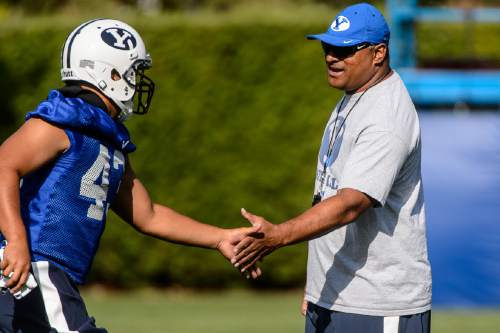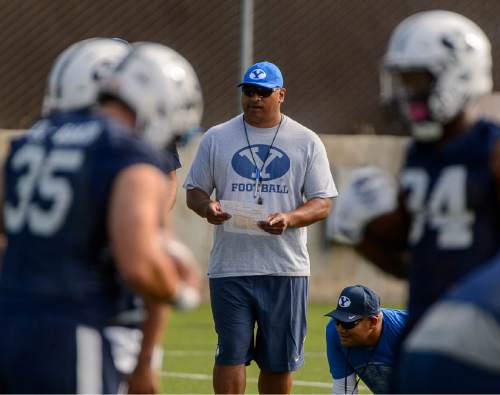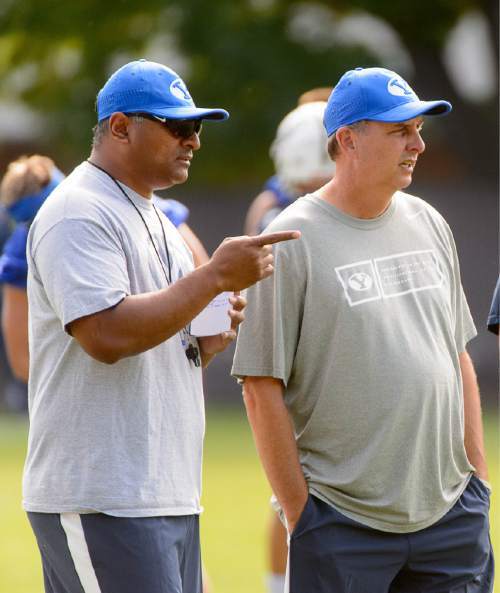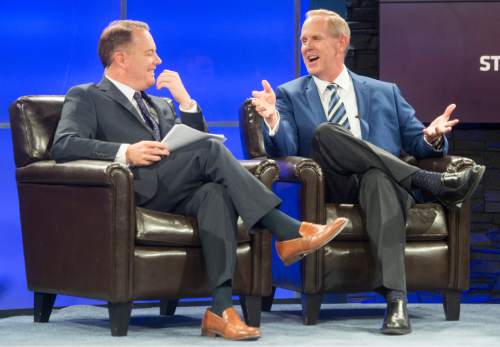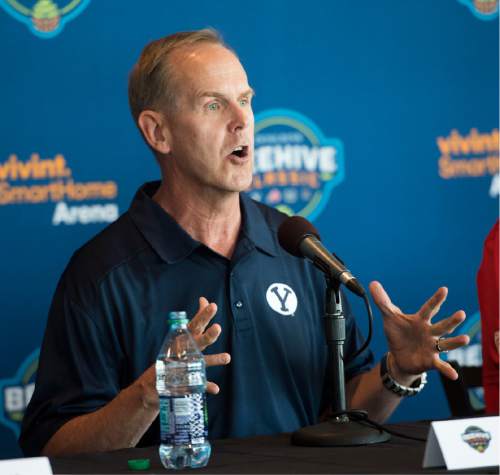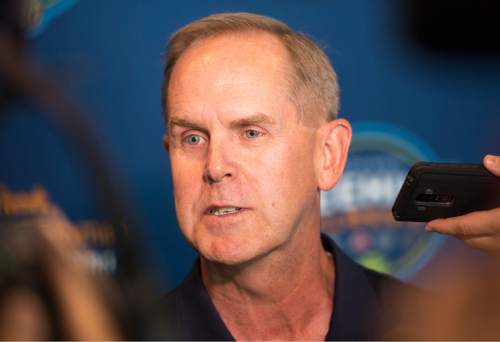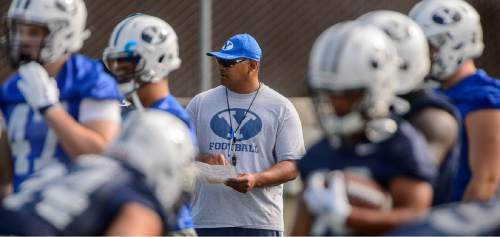This is an archived article that was published on sltrib.com in 2016, and information in the article may be outdated. It is provided only for personal research purposes and may not be reprinted.
The Big 12 has turned its campaign for expansion into a reality show. It has Bob Bowlsby sitting on a couch with a rose, waiting to determine which of the 17 candidates will be blessed with his approval and his presidents' affection.
Based on Bob's own announced qualifying criteria for the scrambling suitors, it appears BYU is the strongest of the group. Whether that matters, with all the vagaries of the heart — along with the pressures and politics — involved, nobody knows.
But like every discarded reality show star of the past, the Cougars have an alternative future to face, if the outcome they desire is held away from their reach. Those alternatives run from the status quo to the severe, from patience to panic. And inside the financial limitations and the big money divide of modern college football, no one has to be a bona fide pessimist to see dark clouds gathering.
Here, then, are the possible routes for BYU, should Bowlsby's rose go to less-deserving contestants:
1) Everything stays the same.
BYU continues its football independence and most of the school's other sports stay in the West Coast Conference. The difficulties of this path have already by articulated by officials at BYU, who have uttered those now-infamous words: "Football independence isn't sustainable."
What that means is not only will the disparity between Power 5 schools and the uninvited grow, what with the P5s getting more and more money from their conference affiliation — the Big Ten is now up to $40-plus million per school per year — and the others get fractions of cash, they have to find a suitable way to consistently schedule games against some of those schools. That would give BYU the perception that it is keeping up competitively, without the monetary rewards. Scheduling will always be a challenge, especially later in the season, when league play is fully underway. But the biggest hurdle blocking equal opportunity is vastly unequal financial footing.
In their competitive pursuit, they need the capacity to recruit the kinds of athletes who can win at the top level. Many elite LDS athletes who might otherwise like to play for BYU will look elsewhere because they want a shot at playing in the Rose Bowl, a shot at a conference championship, a shot at a college football playoff slot, a shot at competing weekly against great teams. That line of thinking already has set in, and if BYU doesn't appear to have a chance to get into a P5 league, it will set in at an even greater rate.
2) BYU waits, hangs on for dear life over the next decade.
The Cougars can forge ahead, competing as best they can, continuing to demonstrate their commitment to football, hoping to get into one of four superconferences, once the current system evolves into that format. Already, BYU is better than many P5 teams, without the advantages those schools currently have via their membership. Perhaps it could edge in, at the right time, among 64 superconference teams.
On the other hand, if the pressures and politics are hot now, think about what would happen if all the outside schools, as well as some of the fringe schools already in P5 leagues, were vying for inclusion in these superconferences. Who would be in charge of making those decisions, who would keep the power, and who would be left out? On that last one, if it's BYU now, would it be BYU then?
3) The Cougars join a lesser league and face their fate.
BYU left the Mountain West in search of more money and more exposure, particularly the latter. Cougar football most certainly is enjoyed by scattered BYU fans, fans who want to see the Cougars play all over the country. But it also is a high profile introduction for many non-BYU fans to the LDS Church — at least that's what the LDS Church thinks. And while the notion that people looking for religious truth would find it via watching college football seems a stretch, BYU, like every other school, has always loved being in front of the cameras.
What do you know about the Mormon Church and BYU's high-octane offense and … would you like to know more?
Returning to the MWC, or some other limited-scope conference, is an option the Cougars might be forced to ponder — unless the same pressures pushing hard against BYU in its quest for the Big 12 might also arise in any potential affiliation. That would have to be considered a step backward for a football program with big ambitions, a 63,000-seat stadium, a trophy case filled with national awards, including a national title trophy, along with a fan base spread from coast to coast.
This path would only be taken if scheduling got to an impossible point, a point of no return in which the opponents the Cougars could schedule in independence were no better than the ones they could build rivalries with inside a lesser league.
4) BYU kills football.
This idea would be laughable had LDS Church leadership not already canceled intercollegiate sports at what is now BYU-Idaho and at BYU-Hawaii, the latter being finished after this academic year. Those schools had terrific, successful athletics programs and, yet, they were done away with.
If the idea behind Cougar football really is best-experience for athletes and fans, and biggest-exposure for the faith, what good will it do to continue competing at a level far under the national radar? For those BYU fans, that's a frightening thought, but one that, given the current social and political climate, cannot be ruled out.
Let's say it all plain here: BYU is the best football and overall sports alternative for the Big 12. Everybody knows it. The school has poured millions of dollars into its sports programs. It has been committed to them. It has a national brand. It has won big-time in the two biggest sports — football and basketball — and it has won multiple national championships in other sports.
And, still, here the Cougars are, stuck in a tough predicament, being left out, if that, in fact, happens, because of their core religious beliefs, all while conservative schools — owned and operated by Catholics and Baptists and other Christian churches — are in. If the athletic and academic merits are there, but the invitation is not, the tracks left for BYU to take are bleak. But they may be all that remains for a school, a proud sports tradition, that deserves better.
GORDON MONSON hosts "The Big Show" with Spence Checketts weekdays from 3-7 p.m. on 97.5 FM and 1280 AM The Zone. Twitter: @GordonMonson.


